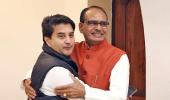'The biggest change that the BJP can initiate in the run-up to 2024 is appointing new faces as chief ministers.'
'In doing so, it will send a message well beyond 2024.'

"The Congress has the perennial problem of misinterpreting its electoral losses. It over reads its victory and under plays its defeat," says Rahul Verma, fellow at the Centre for Policy Research in New Delhi.
Dr Verma is also visiting assistant professor in the Department of Political Science, Ashoka University. His research interests include voting behaviour, party politics, political violence, and media.
In an interview to Rediff.com's Archana Masih, Dr Verma discusses his takeaways from the verdict and the big surprise from Mizoram where a newbie threw out an old warhorse.
What is your assessment of the unexpected Mizoram result which is a big story of this election, but somewhat overshadowed by the results of the five big states?
The Zoram People's Movement won 27/41 and swept the state in terms of seats.
This new alliance won 37.86 per cent votes in its maiden election.
The new Chief Minister Lalduhoma, a former IPS officer is extremely popular, twice as much than outgoing CM, Mr Zoramthanga.
ZPM has defeated both the Mizo National Front and the Congress. The ruling MNF has been reduced to 10 seats -- 16 less than 2018 and the Congress is relegated to fourth place in terms of seats though it has a decent vote share of 20%.
Journalists and observers are calling this Mizoram's AAP 2013 moment.
The ZPM is a combination of six regional parties and organisations that were relegated to the margins. Though the ZPM was formed in 2017, it was recognised as a party by the Election Commission in 2019. The party did not fight the 2018 assembly election, but its members contested as independents and won a good vote share.
What has surprised you about the assembly election results this time?
The results have come as a surprise. The BJP was not expected to win Chhattisgarh. The exit polls suggested that the Congress would sail through considering the scale of its victory in 2018.
Madhya Pradesh was seen to be a close fight with an edge to the Congress. But the BJP romped home in both these states.
It was evident that the Congress campaign was building up in Telangana and the party was expected to win.
Rajasthan has a history of the incumbent being voted out and it seemed difficult for the Congress to retain power.
Therefore, I would say the results in Telangana and Rajasthan were expected, but Chhattisgarh and Mizoram were unexpected.

Has the Congress been erased from North India? Is a revival even possible?
It is very difficult. The Congress needed to win these states to put up a credible fight against the BJP.
A win would not have transformed the party into a formidable challenger, but could have provided some hope.
This also weakens the Congress' ability to anchor the INDIA alliance.
The Congress has the perennial problem of misinterpreting its electoral losses. It over reads its victory and under plays its defeat. It does not do a serious analysis of Opposition strength. A win in any particular state makes it believe that it is on the path of revival.

Post-poll data shows that the Congress has retained its vote share. Can the party seek some consolation from this data?
The election result is clear. The BJP not only won, but swept the Hindi heartland. Therefore, this analysis just soothes the souls of the party and its strategists.
The BJP performed very poorly in Chhattisgarh in 2018, but five years later, it has registered the highest vote share and seat tally since the creation of the state.
In Madhya Pradesh, the BJP has received the highest vote share in the history of the state.
What fresh challenges does it pose for the INDIA Alliance?
As of now, the INDIA alliance exists on paper because it does not have a leader or a structure. All the effort that they made in meeting and conferences in the summer has been undone by these elections.
It needs a new beginning. It is uncertain whether the alliance partners want the Congress to lead the INDIA bloc after its dismal performance.
They have to arrive at a seat sharing agreement and put up a united front -- all these are the imponderables.

Will the BJP execute any radical shifts in politics or governance till 2024?
The biggest change the BJP can initiate is to have new chief ministers in the three states. Fresh faces at the helm will send a positive message that will extend beyond 2024.
Apart from the Ram temple and welfarism, what do you think will be the talking points for the BJP to ensure victory in 2024?
These are not silos. These are all a part of a single narrative of a rising, aspirational India and the assertion of its Hindu identity. One cannot segregate welfarism from Hindutva or the economy... they are all part of the bouquet.
Feature Presentation: Aslam Hunani/Rediff.com











 © 2025
© 2025